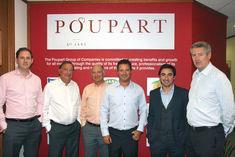
The Poupart story is quite unlike any other in the produce trade. With its combination of family and private investor ownership, the company has undergone a process of constant evolution to remain at the forefront of supermarket supply.
In these times in which being seen as a middle man is almost regarded as an insult, Poupart has made an art form out of the model, developing a strategy of joint ventures leading to full ownership, and transcending numerous fruit categories.
Indeed it’s hard to believe that just a quarter of a century ago Poupart was predominantly a wholesale market business with no connection to the Olins name with which it is synonymous today. But that all changed when the chairman of Hillsdown Holdings invited the family to complete a management buy-in of TJ Poupart and help regenerate the struggling company (see box, page 20).
Fast forward 25 years and five members of the Olins clan – Laurence, Jonathan, Adam, Adrian and Ben – are gathered in Broxbourne, Herts to discuss the strategy that has turned it into a major player on both the UK and European scenes, with a turnover of more than £300 million.
So what was the thinking behind the joint venture ownership model that became the blueprint behind the company’s growth? “We chose the joint venture model as we were fed up with the previous models, where growers would align themselves loosely to marketing companies and then disappear and go somewhere else,” explains chairman Laurence Olins. “We wanted to show our customers we were as close to growers as possible. We were never going to be growers, but the next best thing was to set up marketing companies where growers had an involvement and in some cases an ownership, which was different to a co-operative and a pure privately owned marketing company with no grower involvement.
“Secondly we set up category-specific companies, because we wanted to focus all the employees of that subsidiary to become the experts in that one category. And that was a new concept that we launched to the supermarkets. That was how we initially developed our supermarket business, given that Poupart were by any standards in 1987 Johnny-come-latelys.”
The focus therefore, was applied to implementing this strategy with its first foray being the establishment of OrchardWorld, as a joint venture with the Williamson family in 1989. It was all about offering year-round supply of consistent-quality fruit to the retailers from initially an English base of growers, quickly adding imported suppliers. The same principles were applied at BerryWorld, which Poupart set up with Edward Vinson Ltd in 1994.
The link to the grower has always been stronger than just supplier-marketer though. As well as the new businesses being co-owned by growers in the first place, Poupart, being without any packing facilities of its own, put all its imported fruit through grower-owned packhouses, making use of their staff, equipment and expertise. The grower was offered packing work in the off-season and therefore gained economies of scale to the benefit of both sides. The principle applies as much today as 25 years ago.
In 2000 the company quit the wholesale trade – which it felt would be increasingly difficult to succeed in – and split its import business into two: Poupart Citrus and Poupart Imports. The latter was set up to supply the non-retail sector, and has grown to a £40m turnover this year.
From there on it was a case of taking what was proving an established model and applying it to whatever product area the company wanted to move into next. In 2007 it bought Norton Folgate and expanded its remit beyond cherries into wider stonefruit, and latterly in the past four years Poupart has set up three European joint ventures in the shape of VitalBerry BV for berries, Citrus First for citrus and Fruto del Campo for stonefruit.
The thinking behind the European ventures is clear: if the joint venture, category specific model worked in the UK retail market, there was no reason it shouldn’t elsewhere too. “The better retailers across Europe always have an eye on the UK and what is happening here,” points out Adrian Olins. “BerryWorld set up VitalBerry BV in Holland and Germany to replicate what we learnt in the UK for the European market. The berry market was quite far behind the UK. The biggest steps have been consumer insight and varietal development for BerryWorld. And exactly that model has been taken across to Europe.”
The latest development has been a move into the fast-growing prepared ready-to-eat fruit market with PrepWorld, a division headed by Ben Olins.
And it is this constant ability to adapt to change and predict what the market will require next that has been crucial to Poupart’s evolution, according to David Gray, managing director of Poupart’s parent company Argent Group Europe. “The business is dynamic and you have to both recognise the need to change and then you actually have to make the change, which is far more difficult. This business has always made that judgement call that change is needed. On the wholesale move, for example, we didn’t just wake up one morning and decide we shouldn’t be in wholesale markets; it was a planned and executed exit over a period of time.”
As far as where the business goes from here, Gray believes there is still “significant further growth potential”, not least in areas such as prepared where the company is only just taking its first steps. Is there a whole further generation of Olins coming through? According to the family, that is not necessary – the business has been set up so each division can be managed by the best people for the job. “Coming into Poupart, there’s a very strong platform on which people can build careers,” says Ben Olins.
The model has been proven over and over, and few would bet against the further expansion of the business in the coming years.